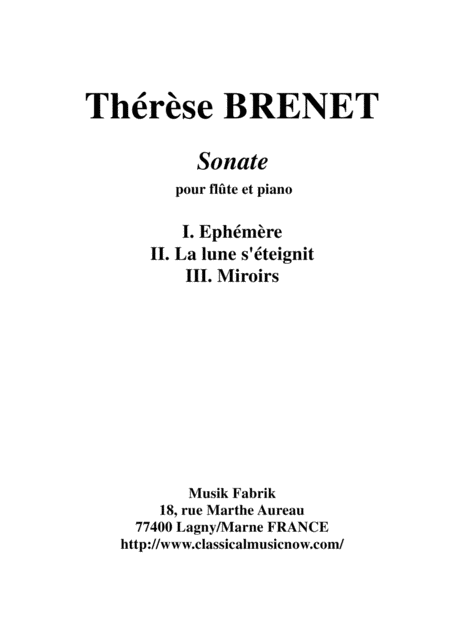Flute,Piano - Level 5 - Digital Download SKU: A0.533397 Composed by Therese Brenet. Concert,Contemporary,Standards. Score and part. 30 pages. Musik Fabrik Music Publishing #2894443. Published by Musik Fabrik Music Publishing (A0.533397). A sonata in three movements for flute and piano: I. EphémèreII. La lune s'éteignitIII. Miroirs The sonata lasts aproximately 13 minutes. Thérèse BRENET, born 22 October 1935 in Paris, France began her musical studies at a very early age, receiving her first prize in Piano from the Conservatoire de Reims.At the Paris Conservatory, her prinicipal teachers were Jean Rivier, Darius Milhaud, Maurice Duruflé, Noël Gallon and Henri Dutilleux and she obtained First Prizes in Harmony, Counterpoint, and Fugue. She finished her studies in 1965, receiving a First Prize in Orchestration, A First Prize with highest honors in Composition and the First Grand Prix de Rome in musical composition.She also won the Halphen Prize for Composition and the Fugue, a grant from the Coplay Foundation of Chigaco and was named honorable member of the National Academy of History of Reims. In 1971, she received the Stéphane Chapelier-Clergue-Gabriel Marie Prize from the SACEM and in 1973, the Silver Medal from the City of Paris.After her stay at the French Academy at the Villa Médicis in Rome, Thérèse Brenet undertook several post-graduate voyages for study, notably to Poland. Upon her return in Paris in 1970, she was immediately named to the Faculty of the Paris Conservatory (CNSMD de Paris) where she also was frequently part of the juries for music theory and composition, as well as electroacoustical music.Thérèse Brenet receiving her definitive SACEM membership from Georges Auric She retired from the Paris Conservatory in 2000 and has since devoted her time to musical composition. She uses both tonal and atonal musical language, which she uses to suit her personal style. Her works are strongly influenced by literature, by painting and by science (especially astronomy). She believes that a composer should use all technical means at his or her disposal and use them rather than be used by them.Her first commission from the French National Radio, Clamavit, for Narrator, Chorus and Orchestra which was premièred by the Orchestre Lyrique de l'O.R.T.F., under the direction of André Girard, with Michel Bouquet as the Narrator, was selected to represent France in the Composer's Forum of 'U.N.E.S.C.O., and was performed in many countries. Many other works have also been performed outside of France in countries such as Switzerland, England, Germany, Belgium, Ireland, the former Yugoslavia, Italy, Portugal, the Netherlands, Libya, Canada, Uruguay, Japan and the United States etc...
